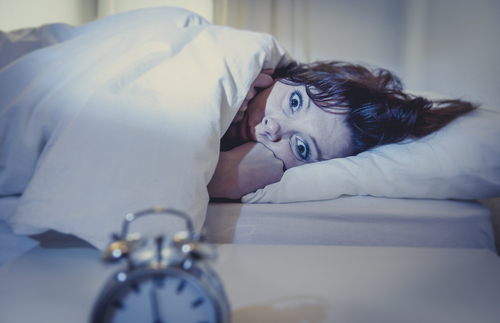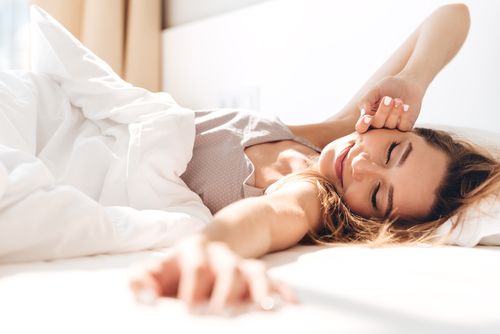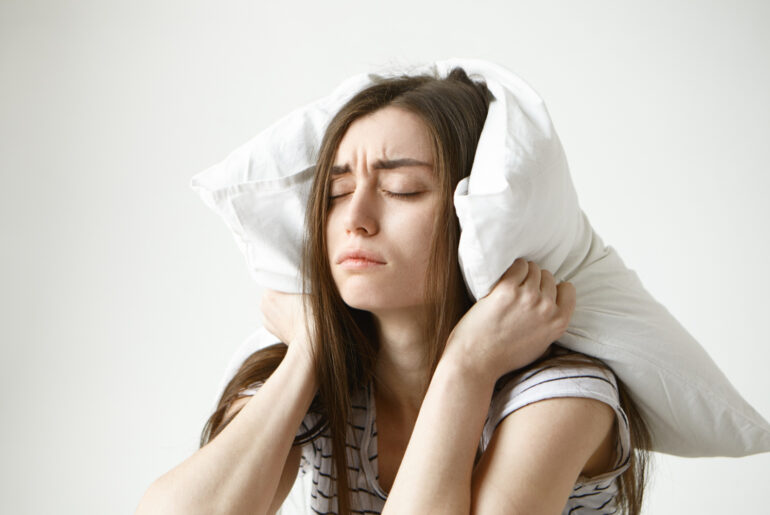Being able to fall asleep at night is a problem suffered by millions of people – approximately 60 million, as far as the US goes. That’s almost 1/5 of the population, which is a very significant number if you think about it. And it isn’t just a North America problem. That statistic could be equally as high in first world countries all over the globe – or worse!
At CantSleep.org, this is a topic that is near and dear to our hearts. Everyone who works here came together not long ago because we were sick of our loved ones – and some of us, ourselves – having trouble getting good, quality rest at night. For many people, laying awake at night and desperately trying to fall asleep is one of the biggest problems human beings suffer from. And for most people suffering from this problem, figuring out why you can’t fall asleep is the first step to solving it. Below are the top 7 reasons that keep most people lying awake at night and unable to sleep.

Reason #1: A Serious Mental Block
Although the human brain is an organ just like your liver or your heart, people do make a strong distinction between mental health and physical health. Furthermore, the reason that we’re listing things like anxiety, depression, worrying, and other mental health issues in the number one spot is because of the fact that it is the number one problem for people who have trouble sleeping.
If you suffer from chronic stress, constant worrying, anxiety, depression, or even loneliness, you are much more likely to sleep fewer hours at night and face are hard to struggle getting to sleep in the first place. And the poorer the quality of your sleep, the harder it becomes to solve your sleep problems.
Thankfully, if your sleep troubles are few and far between, or if you don’t believe they’re serious enough to require a doctor’s attention, there are steps you can take to make it easier for you to fall asleep at night. Spending more time with friends can make you feel less lonely. The same goes for making more time for your family, children, and partner (if you are married). Meditation and mindfulness exercises have also been proven to physically change the structure of your brain in ways that make anxiety and depression less of a problem.
Lastly, you should try to stay away from things that might rile you up or provoke a strong emotional reaction from you within an hour or two of bedtime. This includes emotional forms of entertainment, such as movies, TV shows, or books. You should also probably avoid watching the news late at night – especially if most of the stories you’re seeing these days are troubling you. Taking any combination of the above steps, or even putting them all together, can really help you tackle the problem of not falling asleep at night.
Problem #2: Your Bedroom Is Too Warm at Night
All life on Earth revolves around the planet’s day-night cycle, and human beings are no exception. We’ve evolved over millennia to rise with the sun and to rest once the stars begin sparkling in the sky. As a matter of fact, our basic physiology is designed to revolve around this cycle. In humans, it’s known as the circadian rhythm. This rhythm responds to certain physical and biological queues, such as the temperature. When the sun goes down, the temperature drops. And when human beings feel the temperature drop, we naturally get tired and feel ready for bed. Try turning the temperature down, opening a window on a cold night, or using thinner blankets to take advantage of this.
Problem #3: You Need a Nap
No, we’re not trying to insult you. As strange as it may sound, your inability to fall asleep at night may stem from a lack of an afternoon nap during the day. Anyone who suffers from the popular and dreaded “Afternoon Crash” (sudden, overwhelming fatigue between 1-4 PM) may want to try a short afternoon power nap. These can last anywhere from 20-60 minutes without disrupting your nightly routine.
Problem #4: An Unsatisfying Love Life
Whether you’re not getting enough sex, whether the sex is bad, or whether you aren’t getting any at all, an intimate problem between the sheets can lead to sleep problems there, too. After all, there are so many popular love songs written about how effective amorous activities are for promoting good sleep, it’s gotta be true! Even if you have to fly solo, so to speak, treat yourself to a new toy and give it a whirl.
Problem #5: Too Much Caffeine/Energy Supplements
If you’re already suffering from sleep problems, then reaching for the coffee or the Red Bull can be very tempting. But just remember that moderation is key. You should also avoid indulging in any type of stimulant after lunch. The effects of caffeine especially can linger in your body for several hours.
Problem #6: Your Exercise Routine Needs Work
Exercising too little can give you problems falling asleep at night. Why do you think it’s so easy for children to sleep? Along with their lack of daily stress, they run around and play all day. They burn off their energy so that their bodies need rest. Take a page out of the little ones’ playbook, and try to get more exercise during the day. Even 30 minutes of brisk walking in the late afternoon can provide a similar benefit and help you sleep easier.
Problem #7: You Aren’t Using the Right Sleep Aid
Whether your lack of sleep comes from a mental block, a lack of exercise, or a warm bedroom, there are simple solutions that can help you fall asleep more quickly and sleep more soundly. But taking the right sleep aid also helps. Natural sleep aids, such as Avinol PM, contain safe and proven botanical ingredients. They’re gentle, they don’t have any unhealthy side effects and, unlike dangerous prescriptions or harsh OTC medications, they won’t ruin the quality of rest that you get. So if any of the above tips don’t work, or if you want to take advantage of every possible strategy, you should give Avinol PM a try.





